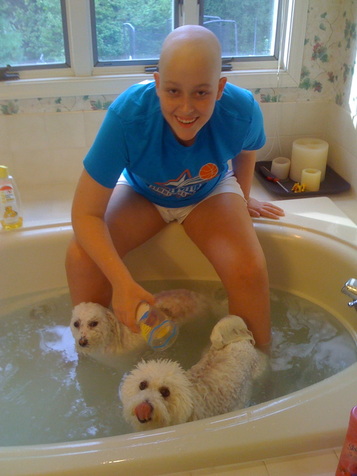 When my purpose for the day was to give my dogs a bath!
When my purpose for the day was to give my dogs a bath! I’m so glad to be back with another, long overdue post! Another amazing year of college just ended and I find myself back at home, completely lost and waiting patiently until I head back to Duke for a summer class, and then leave to go abroad for the fall semester. In these two weeks that I have as a real break, I think back to those two and a half long years I was really stuck here at home, sick with leukemia. Now, I sit here idle on the sofa watching Netflix because I choose to and because my brain is effectively turned off until classes resume.
But, not too long ago, I sat here idle on the sofa watching Netflix because that was all I could do. The difference between the two is not blatantly obvious, no. It is rather a subtle difference actually, but a difference of significance nonetheless. Purpose is the difference.
When going through treatment, it's really easy to lose a sense of purpose in your life. For me, I gain a great sense of purpose and motivation from what I see ahead of me: fun with friends on summer weekends when we aren't in our classes, spending my birthday (July 4) weekend back at home with my family, and studying in Holland this Fall while immersing myself in a different culture for four months. When you go through treatment, you lose a lot of those life-filled activities that get you excited to get up in the morning and just live. I know I found it was easy to lose that ability to "look forward to" the next big adventure. However, with leukemia, the next big adventure often for me was going in for a five-day inpatient chemo trip that ended with me being utterly miserable.
So, I've been wondering, how can a cancer patient regain some sense of purpose? How do you get excited about living a life that no one wants to live through? While I don't know if there's a definitive answer to this question of mine, I have personally come to this conclusion: you have to temporarily refocus your purpose.
Right before I was diagnosed, my purpose in life at that time was to do as well as I could in middle school and be a happy, healthy teen. I had a goal of being a doctor and that reinforced my sense of purpose even more, driving me to do my best in school and my extracurricular activities. But, after I was diagnosed, my days didn't seem to have purpose anymore. Towards the beginning of my treatment, this aimlessness was a real challenge for me. I was used to a schedule, the structured life of a student. I wasn’t used to waking up in the morning, not wanting to eat and laying in bed all day. It was an extremely hard transition.
I wasn't too good at handling that transition at first, I got kind of frustrated by it all: missing school, missing friends, missing “normal.” However, with the support from my parents, nurse, and doctor, I refocused my purpose. I made it a challenge each week to guess my blood counts and learn more about cancer from my doctor. I tried to accomplish things once in a while, even though that was often simply painting or brushing my dogs. I wrote down a lot of what I was going through in a journal too, so that I could document it and remember it all in the future. I also tried to focus on studying and finishing my homework as much as I could, which helped me have a sense of purpose and have the greater goal of going to college after high school. Soon, I realized that I had refocused my purpose. My purpose then was to live through each day, which was often more than enough of a challenge. My purpose was to accomplish little things that reminded me I had a life to live. Whether I set out to get homework done, to watch a whole season of Friends, or to play with my dogs, I made sure I was consciously DOING something. Looking back on all of that, I think now that ensuring I went through each day with some sense of purpose made a big difference for me. I was able to feel somewhat capable and hopeful because of it, and I know that helped me to stay positive.
So, I encourage you to set out to have a purpose each day, no matter what phase of treatment you are in. Whether that purpose is to watch five episodes of your favorite TV show, get up and walk to the bathroom on your own, paint a picture of your dog, take a walk with your family, or finish a school project….. it matters! It matters because what you accomplish each day, however small, can remind you that there is more to your life than pills, needles, and nights in the hospital. When treatment constantly reminds you of how dependent you are, these things can remind you how CAPABLE you are still.
 RSS Feed
RSS Feed

